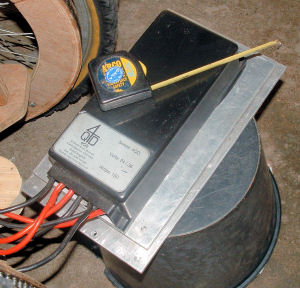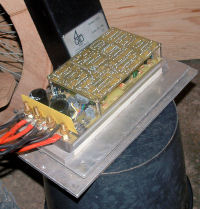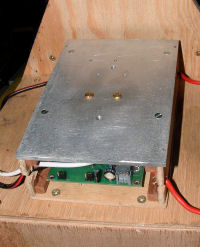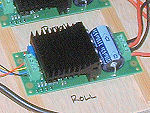 The
motor speed controller is a key element in the
electrical drive system of an electric vehicle. What does it do? The DC motor
speed controller takes the nominally fixed voltage from the
power source, usually your battery pack, and outputs a
variable voltage supply needed to control the motor
speed. Its voltage output to the drive motors changes in
response to control signals supplied by the user – from
a foot or thumb accelerator or a joystick control say.
In modern controllers the main voltage
conversion is done very efficiently using PWM techniques, with much much less
wasted energy than a variable resistor arrangement and,
given a good quality controller, with very smooth speed
control results.
The
motor speed controller is a key element in the
electrical drive system of an electric vehicle. What does it do? The DC motor
speed controller takes the nominally fixed voltage from the
power source, usually your battery pack, and outputs a
variable voltage supply needed to control the motor
speed. Its voltage output to the drive motors changes in
response to control signals supplied by the user – from
a foot or thumb accelerator or a joystick control say.
In modern controllers the main voltage
conversion is done very efficiently using PWM techniques, with much much less
wasted energy than a variable resistor arrangement and,
given a good quality controller, with very smooth speed
control results.
Motor controllers for battery electric
vehicles also bring other valuable control functions –
easily reversed drive, top speed limiting, control over
acceleration and deceleration ramps, over-discharge
protection for the batteries and in “4 quadrant” units
dynamic regenerative braking capabilities in which the power
generated by the motors as they slow a vehicle is fed back
into the battery pack.

It is possible to make an electric vehicle work without a
modern controller but using one provides many advantages
in terms of performance, controllability and efficiency.
The latter issue is important because the Achilles Heel
of most EV's is the amount of energy that can be stored
in a reasonably sized battery pack – loosing a
significant proportion of this through inefficient speed
control circuitry is just plain daft.
DC battery motor controllers are
rated by voltage and current. If you think back to your
high school physics you might remember that electrical
power (in watts) in a DC circuit can be calculated from
P= I x V where I is current in Amps and V is voltage. A
typical smallish 24V 75 Amp controller therefore has an
electrical power output capacity of 24 x 75 = 1800 W or
1.8 kW, about 2.5 Hp. Similar  controllers
are available right up to 48V x 300 Amp units with
nominal power outputs of 48 x 300 = 14400 Watts, about
20 Hp. Note that these electrical powers are not what's
finally available as mechanical work output at the drive
wheels. Inexpensive DC motors may have efficiencies
around the 75% to 85% mark and some energy will be lost
in the mechanical transmission also. Perhaps our 2.5 Hp
electrical output will end up as about 1.75 Hp at the
drive wheels.
controllers
are available right up to 48V x 300 Amp units with
nominal power outputs of 48 x 300 = 14400 Watts, about
20 Hp. Note that these electrical powers are not what's
finally available as mechanical work output at the drive
wheels. Inexpensive DC motors may have efficiencies
around the 75% to 85% mark and some energy will be lost
in the mechanical transmission also. Perhaps our 2.5 Hp
electrical output will end up as about 1.75 Hp at the
drive wheels.
When selecting a controller try to
download the full spec sheet or manual from the
manufacturer and read the conditions that apply to the
current ratings – they are usually time limited and,
because in the end it's controller heating that's
usually the concern, effective heat sinking can make
quite a difference. In my experience however it's much
easier to keep a properly rated controller cool than the
motors it supplies!
Manufacturers' usually also provide
clear instructions on wiring and circuit diagrams -
check their web sites.
I use mainly UK built controllers from 4QD
and have generally had very good service from them. For the
lower power vehicles their low cost Vortex units have worked
well - two basic versions are available with 40 & 75 Amp
ratings well suited to the 250W and 500W vehicles. For
heavier duty we use the 150Amp 4qd series controller shown
above with the cover removed. There are several other good manufacturers of similarly
rated units - follow the supplier links and have a look
around for yourself.
A lower cost alternative can be to use
electric scooter controllers. These tend to be made in the
far east and can be a lot less expensive although perhaps
with fewer features and lower quality. If you go this route
check the number of "quadrants" of the design - many scooter
controllers do not run in reverse. Check also the
requirements for speed control input - they often require a
hall effect speed input "pot". Check
PartsForScooters
for some examples of scooter controllers.
 A
newer experience for me is using smaller H-Bridge type speed
controllers on the DIY Motion Cockpit. These don't have many
of the EV related features that the 4QD controllers have and
are better in rapid or frequent reversing applications.
Devantech are one supplier and I've used their 20 Amp MD03
units. These are of lower current capacity than most EV
related controllers but are also quite a bit cheaper. As
with other types they can be controlled from programmable
microcontrollers and are often used for robot applications.
Many offer a number of different ways of supplying the speed
and direction demands including straight analogue voltage
inputs, PWM voltage inputs and other more sophisticated
methods such as Serial communications and Philips I2C bus
communications - read up on the technical data to see what's
what.
A
newer experience for me is using smaller H-Bridge type speed
controllers on the DIY Motion Cockpit. These don't have many
of the EV related features that the 4QD controllers have and
are better in rapid or frequent reversing applications.
Devantech are one supplier and I've used their 20 Amp MD03
units. These are of lower current capacity than most EV
related controllers but are also quite a bit cheaper. As
with other types they can be controlled from programmable
microcontrollers and are often used for robot applications.
Many offer a number of different ways of supplying the speed
and direction demands including straight analogue voltage
inputs, PWM voltage inputs and other more sophisticated
methods such as Serial communications and Philips I2C bus
communications - read up on the technical data to see what's
what.
Interestingly it is not uncommon for robot builders to make
their own controllers, and if you are interested in more
detail there are some good sites which can help give insight into
how they work and how they can be put together - here's just
a few:
http://homepages.which.net/~paul.hills/SpeedControl/SpeedControllersBody.html
http://www.hassockshog.co.uk/motor_controller_description.htm
And the Open Source Motor Controller Project here
http://tech.groups.yahoo.com/group/osmc/